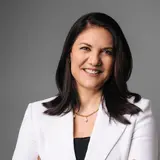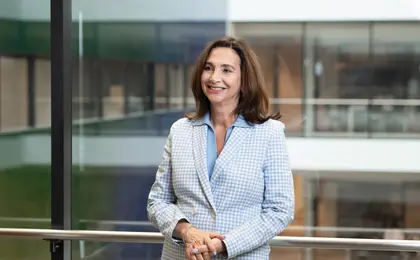
Mary Ellen Iskenderian ’86
MBA
President and CEO, Women’s World Banking
Mary Ellen Iskenderian ’86 had spent decades working in global finance before she became the president and chief executive officer of Women’s World Banking, which works to make financial resources accessible to low-income women in developing countries. But when she was recruited for the position in 2006, she realized that over the course of her career, including 17 years at the International Finance Corporation (IFC), she had never asked a banker about gender equality issues.
Iskenderian had experienced gender disparities in her own career—she had been one of only two women currency traders in her first job after college—but “I didn’t have a gender focus,” she remembers. After gender appeared in the frame, however, it dominated her view.
“Once you see the differences, you can’t unsee that,” she says.
At Women’s World Banking, Iskenderian tries to make those differences visible to banking professionals, financial regulators, and funding partners around the world. The organization formed in 1979 after the United Nations’ first World Conference on Women in 1975. Since she took over in 2006, she has expanded the organization’s partnerships to include not just microfinance institutions—which specialize in small loans to underserved populations—but also large banks, insurance firms, and fintech and digital banking companies. In addition, she spearheaded the launch of an asset management company focused on gender-lens investing; Women’s World Banking Asset Management is in the process of closing out its first $50 million investment fund, which invested in 10 microfinance institutions; a second $103 million fund has invested in a range of inclusive finance companies, and capital is being raised for a third fund.
“I felt strongly that the industry needed an investor that would invest in institutions that not only prioritize gender diversity within their own organizations but in their outreach to clients,” she says. “It’s been a profitable investment strategy.”
Iskenderian has been thinking about how money can be deployed in pursuit of good since she was an elementary school student. As a fifth grader, she helped raise $1,000 through a Peace Corps program to build a school in Peru; she still receives updates on the facility’s progress today. The child of first-generation immigrants—her Armenian father was from Turkey; her mother was born in Italy—she says she first became aware of her privilege when she visited Istanbul with her parents as a child.
“I really got a sense of how people live parallel lives,” she remembers. “I always had a place to eat and sleep and had a great education and loving parents; seeing what some children were facing on the other side of the world was quite formative for me.”
Iskenderian studied in the Walsh School of Foreign Service at Georgetown University, graduating in 1981. She worked in currency trading—including with highly illiquid currencies in the developing world—for three years at Bank of America before attending Yale SOM.
As a currency trader, she says, “I learned so much about how economies really operate and the swings and flows of markets, but I wasn’t a long-term trader. I didn’t think it was impactful enough.”
Iskenderian chose SOM because of its emphasis on management in the public, private, and nonprofit sectors. One course that had a lasting impact was Individual and Group Behavior. “That’s the class I have used the most,” she says. “You touched on some of the most fundamental lessons of working in a group and getting things done through other people.”
She also researched how trade policies affected a country’s economic growth with Louka Katseli, a Greek economist and politician. The experience got her interested in a career in international development.
After SOM, Iskenderian took a job at Lehman Brothers hoping to work with developing countries negotiating with international organizations or banks. But “working on the occasional Argentinian debt renegotiation wasn’t really what I was after when I was thinking about applying all of the lessons of development I had learned academically,” she says. “You really do have to be motivated by money and economic prosperity to be successful in investment banking, and I had other goals in mind.”
In 1989, a contact at Lehman helped point her toward the Young Professionals Program at the World Bank, where she accepted a job in 1989. At the IFC, which is run by the World Bank, her private-sector skills were soon in high demand: The Berlin Wall separating communist East Germany from capitalist West Germany came down the same year.
“For the next eight years, I had a seat at the table of history,” she says.
Iskenderian crisscrossed countries in Central and Eastern Europe, helping to privatize formerly state-owned banks and create stock markets and securities exchanges; later, she worked in Latin American and South Asia. By the time Women’s World Banking recruited her, she was managing more than $1 billion of investments for the IFC.
“The more I rose in the organization, the further away I felt from the people I had left Wall Street to work with,” she remembers. “I was ripe for some headhunter calls.”
Among other initiatives, Women’s World Banking conducts research and helps develop inclusive financial policies and products. In December, it published a report based on an 18-month study of the financial and economic challenges faced by more than 1,200 externally displaced Ukrainian women. In 2019, the organization launched Leadership and Diversity for Regulators, a hybrid virtual and in-person training program that pairs senior banking regulators with high-potential women employees who propose a policy initiative that would increase financial inclusion in their country.
“We’re seeing real results in the policy sphere,” she says.
Iskenderian says she is most proud of her work building out Women’s World Banking Asset Management. The company has exited most of the 10 portfolio companies in its first fund—including a “very” profitable investment in a microfinance institution in Tunisia that led to a partnership with an insurance company there and in two other countries.
For decades, Women’s World Banking relied on grants to operate, but investment through the asset management company “is money people are expecting to get back,” she says. “Being able to put money behind our mission and say, ‘This is a good business strategy’ was such an important, different direction for the organization.”
In 2022, Iskenderian published a book titled There’s Nothing Micro About a Billion Women: Making Finance Work for Women. She says SOM helped provide the foundation for a diverse and fulfilling career.
SOM “prepares leaders for careers that have many chapters—that’s why I chose Yale, and it has turned out to be so valuable,” she says. “I’ve worked in the private, public, and nonprofit sectors, and I don’t think I’m done yet.”





